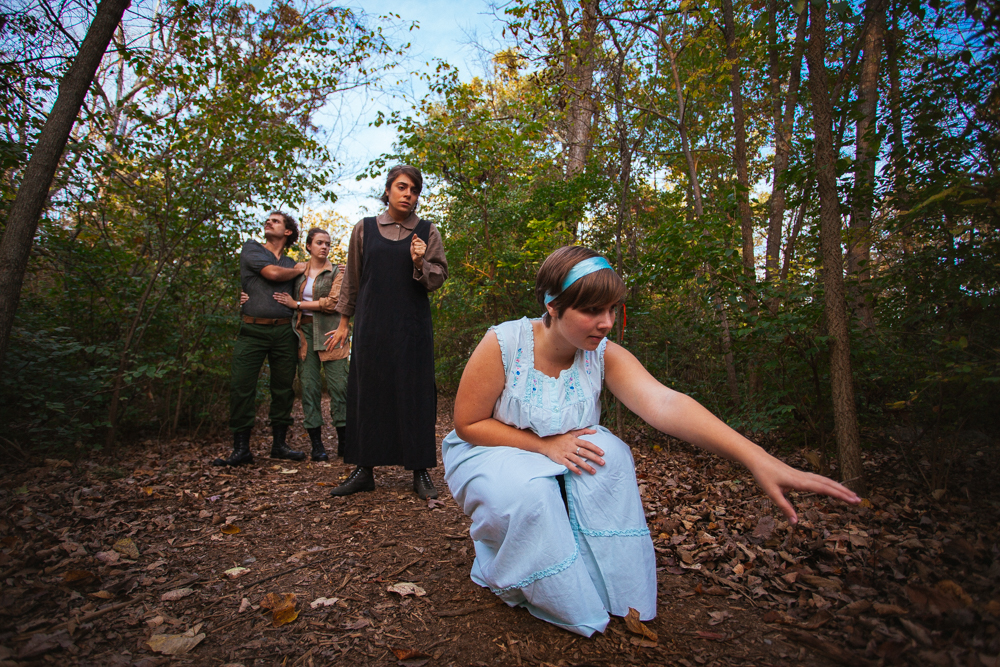By depicting “a culture where violence has become gradually acceptable,” the play Far Away gives the audience a lens to examine their roles and responsibility in the violence of our actual world, says Heidi Winters Vogel, professor of theater at Eastern Mennonite University (EMU). Winters Vogel is directing the production at EMU’s MainStage Theater on Nov. 11-12 and 17-19.
All performances, with the exception of Saturday, Nov. 12, begin at 7:30 p.m. The Nov. 12 performance, which begins at 9 p.m., is part of the Arts Gala Night.
Written by absurdist playwright Caryl Churchill, the play centers around a young hat maker who faces her own complicity in a fictional world full of war and violent imprisonment. The play is appropriate for those middle-school-aged and older.
Winters Vogel first saw Far Away 12 years ago, and has wanted to direct the piece ever since. ” She has been pitching the play to the Theater Department for years, and just this season gained approval for the production. However, the play is complex at best, and absurdly opaque at worst – she wants to ensure her audience would understand it without being “spoon fed.”
Senior Hailey Holcomb read Far Away during the department’s season planning time, and “hated the play while I was reading it the first time … but the longer I sat on it and thought about it, the more sense it made,” says Holcomb. “I think that the way it is written makes people uncomfortable, and then they have to think why, especially when it’s drawing parallels to our own society.”
“We need to talk about the little things that lead to the big things,” says Winters Vogel, referencing the Syrian War, Black Lives Matter movement, and election-centered extremism as examples. How do people talk about violence? Who do we “other?” What systems do we perpetuate that create structural inequality? These are some of the questions she hopes the play will inspire. A response session embedded in the end of the play will allow such discussion to happen within the theater atmosphere.
To promote understanding, Winters Vogel and her crew intend to create a “container,” a world for the playgoers to step into and become part of,through set design and audience participation. The visual focal point for the set design is “The Horde,” a 1927 painting by Max Ernst that evokes World War I’s devastation of Europe. For the set, Anna Westfall, professor in the Visual and Communication Arts Department, has sculpted a giant burlap figure based on the painting – a symbol of the desperation and disconnectedness that is created by and fuels violence.
Graduate student Bethany Chupp plays Joan, the hat maker, “as she navigates the ambiguity of young adulthood in the midst of a world war,” says Chupp. “I think this show will provide an incredible opportunity for the EMU community to discuss what it means to create an ’us‘ and ’them,’ and who we’ve named as such in the midst of current world politics.”
One of the most prescient elements of the play, as Winters Vogel explains, is that “nobody is outright evil. They are just caught up in the normalcy of it.”
Says Holcomb, “it has a lot of commentary that could be applied to the migrant crisis, to racism, to the prison system, to the death penalty.”
In addition to Chupp, a graduate student from Canby, Oregon, the cast also includes Myriam Aziz, a graduate student from Beirut, Lebanon; Emma Roth, a junior from Goshen, Indiana; Elisha Keener, a 2015 graduate from Mount Joy, Pennsylvania; Anna Ressler, a first-year from Kidron, Ohio; Abigail Greaser, a first-year from Goshen, Indiana; Belen Yoder, a junior from Brussels, Belgium; Clara Bush, a junior from Souderton, Pennsylvania; and Dallas Hetrick, a sophomore from Grantsville, Maryland.
Tickets are available through the box office.
